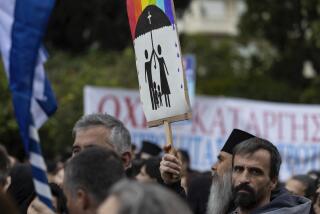The World - News from Nov. 8, 2009
- Share via
NICOSIA, CYPRUS — The two couples had never met each other, and probably never would. They had come from opposite sides of a border between longtime enemies.
But Elie Wakim and Nada Ghamloush from Lebanon, and Dimitri Stafeev and Olga Zaytseva from Israel, had a problem in common: Belonging to different religions, neither couple could get married in their home country, and had to fly to the Mediterranean island of Cyprus to tie the knot.
In the Middle East, civil marriage doesn’t exist and no religious authority will perform an interfaith wedding. Lebanon and Israel are different in that they recognize civil marriages as long as they’re performed abroad, and the closest venue abroad is Cyprus, 150 miles from Lebanon and 230 miles from Israel.
So this island, which claims to be the birthplace of Aphrodite, the Greek goddess of love, has made mixed marriages something of an industry. Its municipalities charge about $415 for express processing and $190 for others, while travel agencies in both Lebanon and Israel offer packages that include travel, luxury hotel, marriage fees and flowers for the bride.
Last year, by Cyprus government count, 523 couples from Lebanon and 1,533 from Israel were married here.
Wakim, 39, and Ghamloush, 33, met at work, fell in love and decided to marry. Their problem was, he’s a Maronite Christian, she’s a Bahai. So Cyprus was their best bet.
Their wedding at City Hall in Nicosia, the capital, was quick and unadorned. A photocopier next to the Wedding Room whirred and creaked as municipal workers handled paperwork. The groom slipped outside for a quick smoke in the parking lot.
Then the marriage officer arrived, recited his lines in English, and the couple exchanged vows. It was over in 10 minutes.
They snapped a few photos of themselves on the steps of City Hall, then hurried off to finish the paperwork. They were catching a 40-minute flight back to Beirut that evening.
Many other couples stay on to honeymoon on the island, a sunny, laid-back escape from their high-stress lives back home at the center of the Mideast conflict. One such couple are Stafeev and Zaytseva, two 29-year-olds of Russian descent who live in a town near Jerusalem.
He’s Jewish, she’s a Russian Orthodox Christian, so they couldn’t marry in Israel unless one of them converted to the other’s faith. Converting to Judaism is a long process of study and ritual, and can be especially difficult for immigrants from the former Soviet Union who may have grown up with no religious education.
Stafeev and Zaytseva were married last month near the seaside city of Larnaca, in a century-old mansion renovated by the municipality with carpets and antique furniture to serve as a suitably romantic backdrop.
In Israel, the Orthodox rabbis who control marriage and divorce argue that their strict definition of Jewishness -- it passes only through the mother -- is vital to preserve the unity of a long-persecuted people, and to spare the offspring of mixed marriages from inheriting similar problems when their time comes to marry.
Clerics are just as firm in Lebanon, whose Muslim and Christian populations subdivide into 18 officially recognized religious groups.
“For us, a person who has civil marriage is like a person who is committing adultery,” said Father Joseph Abdul-Sater, a Maronite Catholic priest and religious judge. “The marriage is the sacrament while civil marriage is a contract, and for that reason it is considered cohabitation.”
Mohammed Dali Balta, a Sunni Muslim judge, said in an interview that if human beings are allowed to write marriage laws, rather than live by religiously sanctified Muslim law, “they can one day legalize marriage between homosexuals.”
The Israeli and Lebanese couples who marry in Cyprus tend to feel bitter and discriminated against, and while they may consider each other enemies, they would probably find much to agree on as far as marriage law is concerned.
“Who is ruling the country? In a way, it’s the religious parties,” said Wakim, the Lebanese groom. “Not separating the church from government from the beginning . . . this is the biggest problem.”
Ghamloush, his bride, said Lebanon, with so many religious groups, badly needs civil marriage. “Because if you respect your partner, you shouldn’t expect him to change his religion for you.”
Stafeev, who works in construction in Israel, said people’s religion should be their own affair. “Israel is a democratic state,” he said. “Everyone should have the will and the right to do what they want.”
Both Lebanon and Israel have champions for change.
Last year a campaign called “All for Civil Marriage in Lebanon” spread through Facebook and became a movement that is trying to legalize civil marriage for those who have no other option, said Basil Abdullah, a Lebanese civil rights activist. Political rivalries have stymied the effort, he said, but he was optimistic it would eventually succeed.
In Israel, the marriage issue is a political line in the sand that can threaten governments dependent on religious parties for their parliamentary majorities.
Mixed couples in common-law marriages have won some relief from a 2002 Supreme Court ruling granting them the same rights and benefits as those in religiously sanctioned unions, but they still aren’t recognized by the state as married unless they go abroad and have a civil marriage.
Irit Rosenblum, a civil rights lawyer who campaigns for civil marriage, says for many couples, equal benefits aren’t enough; to be registered by the state as married “is really important mentally for them.”
--
Hadjicostis writes for the Associated Press.
Bassem Mroue and Zeina Karam in Beirut and Ian Deitch in Jerusalem contributed to this report.
More to Read
Sign up for Essential California
The most important California stories and recommendations in your inbox every morning.
You may occasionally receive promotional content from the Los Angeles Times.












